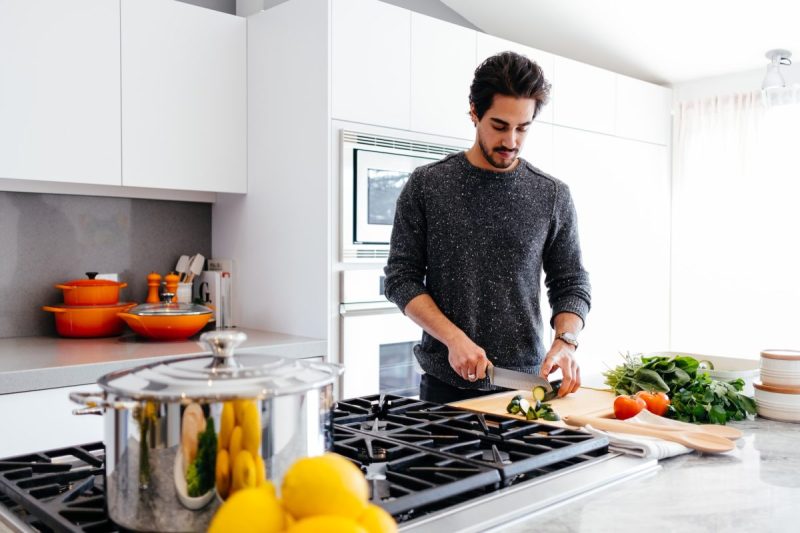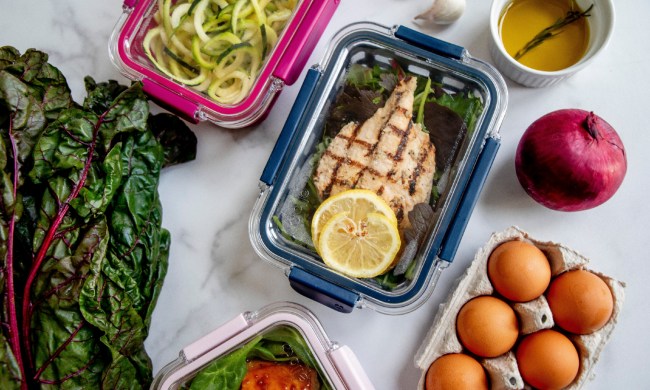
If you don’t have IBS, you don’t know what it’s like deciding between eating your favorite foods or spending the evening in misery. For those that suffer from irritable bowel syndrome, you know anything you eat or drink could be a ticking time bomb that ends with you in the bathroom. If IBS is a part of your life, here’s what the experts have to say about what causes it, if there’s a cure, and how to live with the disorder. We chatted with Christine Lothen-Kline, Dietitian Director at ModifyHealth, about the topic.
How someone develops IBS
Unfortunately for humans, anyone at any age is able to develop IBS. But, once you hit 50 years old, your chances of ever having it drop considerably, so you’ll be able to relax a bit more by then. “The causes of IBS are still not clearly understood but are likely multifactorial,” Lothen-Kline said.
Main reasons you get IBS
- Stress
- Bacterial infections
- Food sensitivities
- Genetics
Most people start noticing symptoms around 2o years old, with 20 to 30 years old being the age range to watch. It’s also more common in women, with twice as many women having the condition.
How to deal with IBS and still live your life
Is there a cure for IBS? Well, no, not exactly. Lothen-Kline says there’s not necessarily a forever cure so much as there is a way to manage your symptoms. “As we currently understand IBS, it is not permanently cured, but between lifestyle changes and, if needed, medication management, in most cases, it can be well-controlled with minimal symptoms,” she explained.
There’s a reason why living with IBS can be so painful. “Many people with IBS have what is called visceral hypersensitivity, meaning the nerves involved in the gut-brain connection are extra aware of and amplified by stimuli; put more simply, many people with IBS feel abdominal pain and discomfort more acutely,” Lothen-Kline explained.
So, what can you do?
The easiest ways to cope with having IBS
-
- Don’t diagnose yourself
“It is important to see a physician to get a diagnosis for your GI symptoms and rule out more serious conditions,” Lothen-Kline said.
- Reduce stress
Easier said than done, we know. But this even includes calming yourself down before you eat. “Stress management techniques, such as exercise, meditation, and breathing exercises, can all be helpful in managing IBS symptoms. In particular, gut-directed hypnotherapy (think guided meditation) has been found to be 70 to 80% effective in improving IBS symptoms,” Lothen-Kline said.
She recommends apps like Nerva that use calming hypnotherapy to manage your IBS.
- Alter lifestyle and food choices
This is a bit of trial and error, as a lot of healthy foods cause IBS. Identify what those are for you, then follow a low FODMAP diet (avoiding the foods that contain fibers and sugars people’s bodies can’t break down properly).
‘For some people, IBS takes a significant toll on their quality of life,” Lothen-Kline said. “These individuals can get significant improvements in their IBS symptoms by identifying the foods that trigger their symptoms. There are structured and controlled methods, such as the FODMAP protocol, that can be utilized to help people identify their triggers. Working with a Registered Dietitian that specializes in GI issues to support you through this process can help you feel your best again. Don’t accept that you ‘just have to live with it!'”
- Medication as needed
Whether you need help to control the diarrhea, your bloating, or the pain, if you feel like medication is the choice for you, speak to your doctor.

How to live with IBS comfortably
Before you start treating anything, the first step is to make sure you are properly diagnosed with IBS. Lothen-Kline warns against “self-diagnosing” because there are plenty of gut issues out there — yay, gut issues! — and you need to make sure you are treating the correct one.
How to treat the symptoms
“There is not one set of foods that is good for everyone, but there are good overall eating practices that are helpful for most of us, with or without IBS,” Lothen-Kline said. These gut hygiene 101 tips include the following:
- Cut out the processed foods.
While it’s easier to cook these kinds of foods, the amount of artificial ingredients and sugar in them is hurting your stomach. “Eat a variety of whole or minimally processed plant foods, including legumes, nuts, seeds, whole grains, fruits, and vegetables,” Lothen-Kline said. “Minimize eating foods that are highly processed or include added sugars or artificial additives, and eat foods, like yogurt, kefir, kimchi, and sauerkraut that were naturally fermented to create beneficial probiotics.”
- Space your meals out.
If you like to be a hobbit and eat breakfast at 8 a.m. and second breakfast at 10 a.m., you aren’t doing your digestive system any favors. Spread snacks and meals out, with at least three hours in between, shooting for four hours.
- Sit down when eating, and chew your food slowly.
We are always on the go, go, go, but your stomach is saying no, no, no when you eat like that. Savor the food, chew it well, and stop wolfing it down.
Really, everyone needs to take the IBS treatment tips and apply them. You know you eat your food too fast and probably eat standing or walking more than you should. While there isn’t a miracle cure for irritable bowel syndrome, with IBS treatments and dietary changes, you’ll be able to enjoy food without having to keep an eye on all potential restrooms after every meal.



